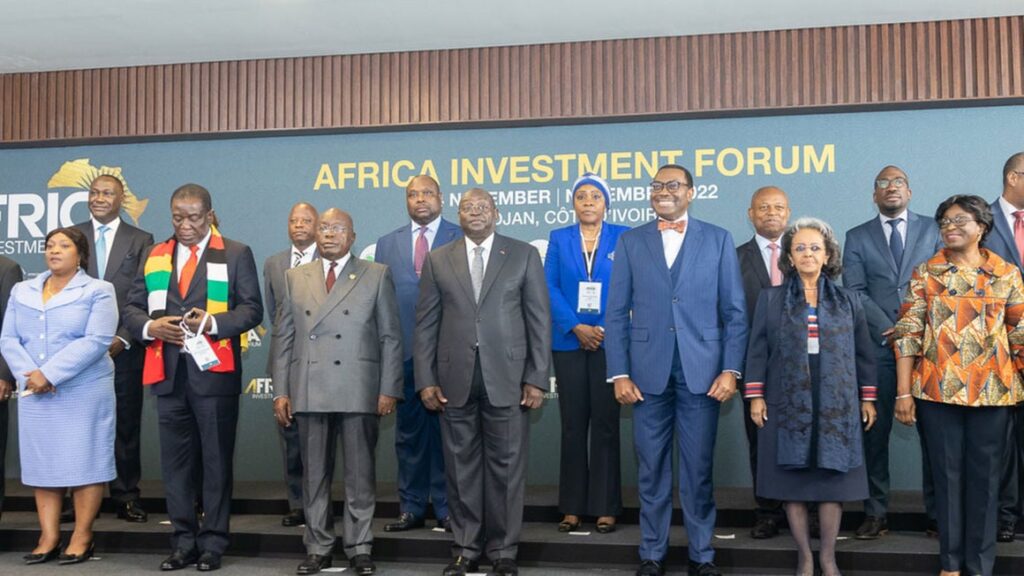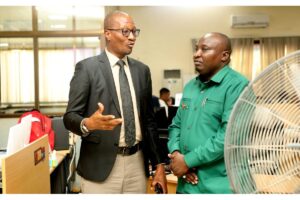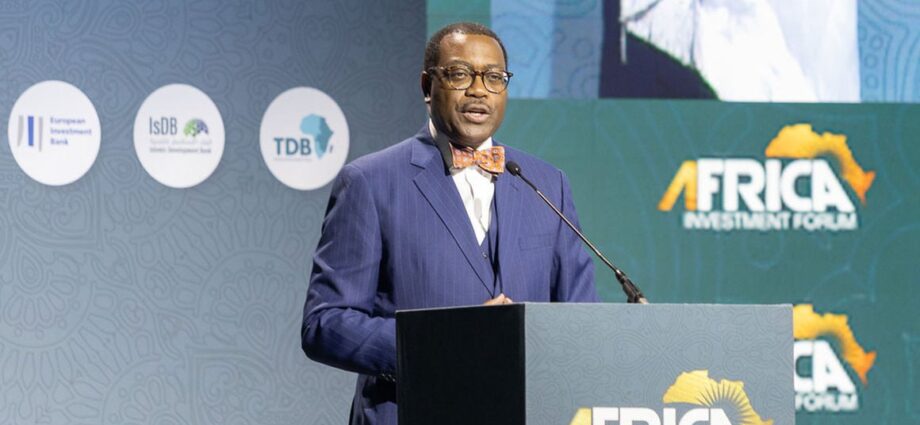African Development Bank president Akinwumi Adesina speaks during the opening ceremony of the Africa Investment Forum 2022. He noted that Africa has the lowest default rate on infrastructure projects in the world, at 5.5 per cent. PHOTO | COURTESY | AFDB GROUP
By JACKSON MUTINDA
African leaders have said the continent’s investment risk has been exaggerated, making investors hesitant to put their money in its development projects.
Quoting a Moody’s Analytics report on defaults on infrastructure investments, African Development Bank (AfDB) president, Dr Akinwumi Adesina, noted that Africa has the lowest default rate on infrastructure projects in the world, at 5.5 per cent.
“Africa is not as risky as you think. Perception is not the same as reality,” Dr Adesina said at the opening of the Africa Investment Forum in Abidjan, Cote d’Ivoire, on November 2.
The biggest defaulter, according the Moody’s report, is Latin America at 12.9 per cent, followed by Asia at 8.8 per cent, Eastern Europe (8.6 per cent), North America (7.6 per cent), and Western Europe (5.9 per cent).
Recovery from Covid pandemic
“Africa has shown resilient recovery from the Covid-19 pandemic. Foreign direct investment (FDI) declined from $47 billion in 2019 to $40 billion in 2020 because of Covid. Africa recovered in 2021, as FDI rose to $83 billion, doubling the flows in 2020,” he said.
Heads of state attending the forum amplified Dr Adesina’s sentiments. They included Ghana’s Nana Akufo-Addo, Zimbabwe’s Emmerson Mnangagwa, Ethiopia’s Sahle-Work Zewde and Ivorian Vice-President Tiemoko Koné.
The leaders said that having one of the world’s largest young populations, natural resources and renewable energy potential, the continent is the investment frontier in the world.
President Akufo-Addo said the African premium risk has become a huge obstacle to development as it hampers investment. Noting that the global investment environment is difficult, he said Africa has excellent returns on investment and urged businesses to take advantage of the continent’s demographic dividend to foster growth.

Participants pose for a photo at the opening ceremony of the Africa Investment Forum 2022 in Abidjan, Cote d’Ivoire, on November 2. PHOTO | COURTESY | AFDB GROUP
Electric cars
Dr Adesina said the future of electric cars in the world depends on Africa because it has the largest sources of cobalt in the world, with massive sources of lithium in Zimbabwe, Namibia, Ghana, Mali, and Democratic Republic of Congo.
“The African Continental Free Trade Area is the largest free-trade zone in the world, connecting economies worth $3.3 trillion,” he said.
The Africa Investment Forum — Africa’s premier investment marketplace now in its fourth year — helps to connect investors to Africa. The African Development Bank, the Africa Import-Export Bank, the Trade and Development Bank, the Africa Finance Corporation, the Development Bank of South Africa, the European Investment Bank, the Islamic Development Bank and Africa50 support it.
It is aimed at mobilising investments for Africa, and showcase the continent’s bankability to the world.
Investment interests
In four years, it has helped to mobilise $110 billion in investment interests to Africa, said Dr Adesina.
“The $600 million securitised finance to support the cocoa board of Ghana has helped Ghana to grow its cocoa production by one million tonnes, with infrastructure for warehousing and cocoa processing. The landmark $24 billion liquefied natural gas project of Mozambique, which was structured and closed at the Africa Investment Forum, is the largest-ever foreign direct investment in Africa. It will turn Mozambique into the third-largest exporter of natural gas in the world and add $66 billion to its economy,” he said.
The leaders have curated investment projects in renewable energy, hydropower, gas, railways, roads, and water transport, agriculture, health, mining, fertiliser manufacturing, port infrastructure and urban green transport to woo investors.
Share this news
This Year’s Most Read News Stories

Zanzibar liquor importers face fresh hurdle despite court order
The liquor shortage in Zanzibar is far from over, even after a court order granted relief to the three importers.Continue Reading

Tanzania’s opposition party ACT Wazalendo honours veteran politician under new policy
Unguja. Opposition party ACT Wazalendo today officially bids farewell to its former Chairman, Juma Duni Haji, also known as Babu Duni, as part of a new policy designed to honor retired senior leaders at a ceremony held at Kiembesamaki, Zanzibar.
The initiative highlights the party’s commitment to recognizing and supporting individuals who have served with dedication and integrity.
Babu Duni, who stepped down earlier this year, was succeeded by Othman Masoud, now the First Vice President of Zanzibar.
The policy aims to provide ongoing respect and support to retired leaders, ensuring their continued recognition and contribution to the party’s development.
“Recognizing their significant contributions to the development and prosperity of the party, this policy ensures that retired leaders continue to be acknowledged and respected by both the party and the community,” the policy states.
To benefit from this policy, leaders must not have left or been expelled from the party. They must have served the party with honor and dedication. The national leadership committee will determine whether a leader has fulfilled these criteria.
The policy seeks to honor retired leaders, protect their dignity, acknowledge their contributions, leverage their ideas for the party’s growth, and support them to the best of the party’s ability.
In honoring these leaders, the party will provide a vehicle, the type of which will be determined by the national leadership committee. Additionally, they will receive a monthly allowance, with the amount also set by this committee.
Other benefits include health insurance. If a leader does not own a home, the party will cover their rent at a rate decided by the committee.
The leadership committee may also grant special recognition based on the leader’s contributions. Retired leaders will participate in decision-making meetings according to procedures outlined in the party’s constitution.
Depending on the party’s resources at the time, the policy may also apply to retired deputy chairpersons for both the mainland and Zanzibar, the Secretary-General, Deputy Secretary-General for both mainland and Zanzibar, and the party’s Attorney General.
Additionally, leaders, executives, or members with exceptional contributions to the party’s protection, advocacy, and defense may also benefit, as determined by the leadership committee.
Currently, those who are eligible for benefits under this policy include Juma Duni Haji (retired party Chairman) and Zitto Kabwe (retired party leader).Continue Reading

‘Sovereignty alone won’t solve Zanzibar economic woes’
The ruling party in Zanzibar on Monday , March 13, responded to growing demands for full autonomy in the Islands, saying sovereignty doesn’t guarantee economic strength.Continue Reading











